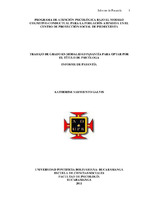Programa de atención psicológica bajo el modelo cognitivo-conductual, para la población atendida en el Centro de proyección social de Piedecuesta
Fecha
2014-09-09Director/Asesor
Ochoa, Pedro Pablo
Tipo de contenido
workingPaper
Citación
Metadatos
Mostrar el registro completo del ítemDocumentos PDF
Resumen
El presente informe tiene como finalidad dar a conocer la información recolectada durante la realización del trabajo de grado en modalidad pasantía en el Centro de Proyección Social de Piedecuesta, durante el primer semestre del año en curso. El programa que se desarrolló tuvo como nombre: “Programa de Atención Psicológica bajo el modelo cognitivo-conductual para la población atendida en el Centro de Proyección Social de Piedecuesta”. El número de consultantes que solicitaron el servicio psicológico fue de 77, de los cuales 41 eran remitidos por las instituciones educativas y 36 eran particulares. De estos 77 consultantes, 52 pertenecían al género masculino y 25 al género femenino. Dentro del servicio psicológico que se realizó, se trabajaron 2 orientaciones profesionales a bachilleres que deseaban conocer en que carreras profesionales se adecuaba su perfil y también se realizaron 6 valoraciones psicológicas para procesos de matrículas en los que se evaluaría la conducta y personalidad de los aspirantes a las instituciones que tenían convenios con el Centro de Proyección Social. El 47% de los consultantes pertenecían a la categoría de infantes (2-11 años), siendo esta la mayor población atendida, el 38% pertenecían a la categoría de adolescentes (12-17 años) y por último el 15 % pertenecían a la categoría de adultos jóvenes (18-39), los cuales hacen referencia a los rangos de edad de consultantes atendidos. Las hipótesis diagnosticas de mayor reincidencia fueron: la agresividad (31 consultantes), bajo rendimiento académico (19 consultantes), aislamiento (17 consultantes) y por ultimo dificultades del aprendizaje (8 consultantes). Dichos datos validan los resultados expuestos en informes pasados y dejan entrever la importancia que sigue teniendo el hecho de fortalecer las acciones en el trabajo con la población infantil y adolescente en materia de, promoción y prevención e intervención, enmarcadas en el modelo cognitivo-conductual desde el cual, se resaltan la reestructuración cognitiva, la terapia racional emotiva, la terapia de resolución de problemas, la terapia de autocontrol, entrenamiento en habilidades sociales, técnicas de estudio, refuerzo positivo, la psicoterapia y la vinculación con redes de apoyo. La iniciativa de trabajar dichas temáticas surge a través de las problemáticas que se presentan en el Centro de Proyección Social de Piedecuesta. En conclusión la utilización del enfoque cognitivo-conductual permite debido a su eficacia, eficiencia y versatilidad ajustarse a las situaciones y problemáticas encontradas. The objective of this report is to announce the information gathered during the realization of the grade work in modality internship at the Center of Social Projection of Piedecuesta, during the first semester of the school year. The program that was developed was named "Psychological Care Program under the cognitive-behavioral model for the population served at the Center of Social Outreach of Piedecuesta". The number of patients who sought psychological support was 77, of which 41 were referred by educational institutions and 36 were private individuals. Of these 77 patients, 52 were males and 25 were females. Within the psychological service that was carried out, 2 were high school guidance counselors who wanted to know which careers suited their profile, and 6 psychological assessments also were carried out for the processes of registering those who would have their behavior and personality evaluated from the applicants of the institutions that had agreements with the Center of Social Projection. 47% of the consultants belonged to the category of infants (2-11 years), this being the biggest assisted population, 38% belonged to the category of adolescents (12-17 years) and lastly 15% belonged to the category of young adults (18-39), which makes reference, to the ranges of assisted patients age’s. The diagnostic hypothesis of the greatest recidivism were: aggressiveness (31 patients), low academic yield (19 patients), isolation (17 patients) and finally, learning difficulties (8 patients).
These data validate the results presented in prior reports and hint at the continuing importance of the fact that strengthening the actions in working with children and adolescents in terms of promotion and prevention and intervention, framed in the cognitive-behavioral model, which highlights restructuring cognitive, rational emotive therapy, the therapy of problem resolution, self-control therapy, training in social abilities, technical study, positive reinforcement, psychotherapy and linking with support networks. The initiative of working with these issues arises through the problems that are presented at the Center of Social Outreach of Piedecuesta. In conclusion, the use of the cognitive-behavioral model allows for effectiveness, efficiency and versatility to adjust to situations and problems encountered.
Palabra/s clave
Psicología
Centro de proyección social - Piedecuesta
Universidad Pontifica Bolivariana
Piedecuesta (Santander, Colombia)
Población - Piedecuesta
Estudiantes
Atención - Pruebas
Pruebas psicológicas
Hipótesis
Psicología del aprendizaje
Colecciones
- Trabajos de grado [6698]


